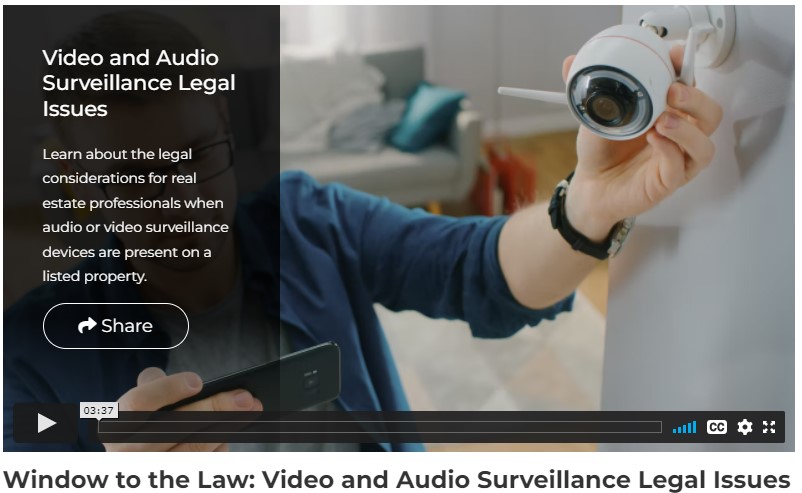Video and Audio Surveillance Legal Issues. Smart phones and wireless cameras make it easy for homeowners to keep eye on their property. But when that home is listed, real estate professionals needs to know the legal considerations when surveillance devices are present on a property.
Home sellers use surveillance devices for a variety of reasons; and thanks to smart phones, even today’s buyers use personal devices during their homebuying search. But, the use of recording devices isn’t without legal risk and can lead to both civil and criminal liability.
So, before pressing “record”, watch this Window to the Law to learn how to navigate audio and video surveillance in real estate transactions.
How you can use audio and video surveillance will depend on where the recording takes place. State law generally permits video-only surveillance without consent, except in places where a person has a reasonable expectation of privacy, such as a bathroom. That said, some states do require notice or treat the permissibility of video-only recordings differently depending on whether the camera is visible.
Audio recordings are trickier and are governed by both federal and state law. Typically, at least one party to a communication must consent to a recording, but some states, like California, Florida and Illinois, require the consent of all parties.
Keep in mind that consent must be obtained from a person present and participating in the communication. While some states have exceptions for property owners, in most states it would be inappropriate for an absent homeowner to press record and capture a conversation between a buyer and their agent without either their express consent or their implied consent through, for example, the posting of a conspicuous notice of the recording.
With the ever-growing use of property surveillance, keep these best practices in mind:
- Address a seller’s use of surveillance devices in the listing agreement; require sellers to disclose any devices, warn of the legal risks associated with audio and video surveillance, and require indemnification for any unlawful surveillance by the seller.
- Recommend sellers provide notice of property surveillance, even when notice isn’t required.
- Disclose any known property surveillance to other participants in the MLS; in fact, some MLSs may require disclosure upon submission of a listing.
- Remind sellers of their fair housing obligations. Video surveillance can reveal a lot about prospective buyers. If you suspect a seller is using video footage to violate the law, document your concerns in writing, and depending on the circumstances, consider removing yourself from the transaction.
- Inform buyers of the potential for surveillance devices during showings and of any known devices in writing.
- Counsel buyers to assume they are always being recorded and to avoid discussing a buyer’s interest at the property. Not only is it possible there may be undisclosed surveillance devices, but in some states, like Wisconsin, homeowners aren’t required to disclose surveillance devices used during private showings or open houses.
- And, finally, advise buyers against taking pictures during a showing and to avoid posting photos on-line.
Knowing your state law is the key to not only helping your clients navigate these issues, but to protecting you from legal liability.
And, remember to smile. Because you just may be on camera.
Previously posted by REALTOR.com

